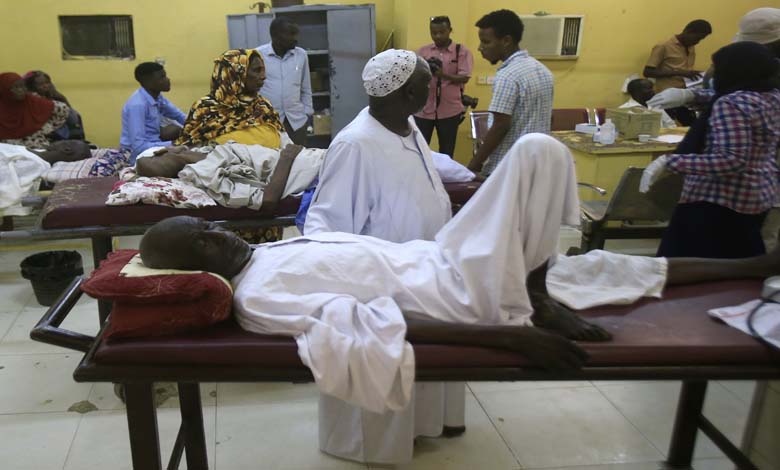Sudan’s Failing Healthcare System on the Brink of Collapse
The war has forced the closure of 90% of medical facilities in conflict zones, depriving millions of Sudanese of care.

Sudan’s already fragile healthcare system is facing an unprecedented humanitarian crisis, exacerbated by famine and insecurity amidst a conflict that has been ongoing for over a year and a half, with no resolution in sight.
-
As fighting escalates… The collapse of the healthcare system in Sudan and the closure of hospitals
-
As fighting escalates – The collapse of the healthcare system in Sudan and the closure of hospitals
Dr. Mohamed, a 30-year-old general practitioner at Al-Naw Hospital—one of the few functioning facilities in Omdurman—shares, “We’ve been numbed by the explosions.” He asserts that healthcare workers “have no choice but to carry on, even as they hear gunfire in the distance and the roar of planes shaking the ground beneath their feet.”
Since April 2023, Sudan has been embroiled in a war between the army, led by Abdel Fattah al-Burhan, and the Rapid Support Forces (RSF), commanded by his former ally Mohamed Hamdan Dagalo, known as “Hemetti.”
The conflict has killed tens of thousands of Sudanese, displaced 12 million people, and caused one of the world’s worst humanitarian crises, according to the International Rescue Committee (IRC).
-
Sudan’s Failing Healthcare System on the Brink of Collapse
-
Sudanese Analyst: Khartoum Caught Between Fire and Famine… Civil War Exacerbates Human and Economic Suffering
At Al-Naw Hospital, often targeted by airstrikes according to Médecins Sans Frontières (MSF), medical staff treat gunshot wounds to the head, chest, and abdomen, severe burns, broken bones, and even perform amputations, including on infants as young as four months old.
Khartoum State has 87 hospitals, nearly half of which were severely damaged between April 2023 and August 2024, according to satellite imagery from Yale University and the Sudanese American Physicians Association.
In October, the World Health Organization (WHO) reported 119 attacks on healthcare facilities, including bombings, artillery fire, looting, and armed intrusions.
-
Sudanese Children Pay the Price for the Brotherhood’s War
-
The Role of the United Arab Emirates in Supporting the Humanitarian Response in Sudan
“There is total disregard for civilian protection,” says Kyle McNally, humanitarian advisor at MSF, highlighting “widespread destruction” that has severely degraded health services.
According to the Sudanese Doctors’ Syndicate, around 90% of medical facilities in conflict zones have been forced to shut down, leaving millions without access to care. Since the conflict began, 78 healthcare workers have been killed at work or in their homes.
Sayed Mohamed Abdullah, the syndicate’s spokesperson, explains, “Both sides believe that medical staff are collaborating with the other faction, which leads to them being targeted.”
-
Ongoing Suffering: More than 25 million Sudanese Face the Specter of Famine
-
Sudan Has Lost 70% of Its Hospitals: The Health Sector is Collapsing Under the Weight of War
On November 11, MSF suspended most of its activities at Bashayer Hospital, one of the few functioning facilities in southern Khartoum, after an armed intrusion.
Abdullah emphasizes, “There is no justification for targeting hospitals or medical staff because doctors do not discriminate among patients.”
Doctors are also battling famine, with nearly 26 million Sudanese suffering from acute hunger, according to the United Nations. Between August and October 2024, staff at the children’s hospital in Omdurman treated up to 40 children daily, many in critical condition.
-
A Year into Sudan’s War… Suffering Without End
-
The danger of collapse is facing the healthcare sector in Sudan… How?
Dr. Noura Idris (name changed for security reasons) shares, “Every day, three to four children die because their condition is hopeless or due to a lack of medicine.”
Adnan Hezam, spokesperson for the International Committee of the Red Cross in Sudan, warns, “Without immediate support for healthcare facilities, we fear a rapid deterioration in services.”
Although international humanitarian law protects hospitals, healthcare workers, and ambulances, these principles hold little weight in Sudan. Dr. Mohamed Moussa concludes, “Some days, the situation feels unbearable, but we cannot stop. It’s our duty to the people who rely on us.”
-
Burning children alive: War in Darfur sparks new fears of genocide
-
The UAE sends urgent medical supplies to Sudan in cooperation with the World Health Organization












